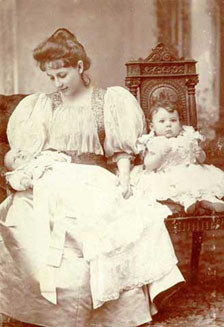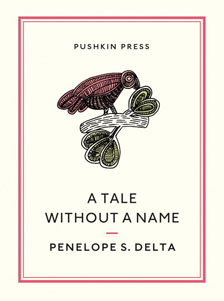Through a child’s eyes
by Mika Provata-CarlonePenelope Delta was born in 1874 in Alexandria, where there was then a thriving Greek community. She belonged to the Greek aristocracy of her time, both extraordinary in its endeavours, and, like high Victorian and Edwardian society, decidedly structured in its make-up. She could easily have walked out of a novel by E.M. Forster, Marcel Proust, Henry James, Virginia Woolf, but possessed a vision and voice all of her own.
In 1895 she married Stephanos Delta, a man of dynamic charisma and able to offer her a milieu she would thrive in: culturally rich, intellectually pregnant, poignant, empowering and liberating for a woman of her calibre and discernment. She did not fall in love with him, but she loved and cherished him. Delta was the kind of person who could build something out of nothing, a woman who could accept both happiness and misfortune without fatalistic resignation, but with the strength of self-effacement. And she insisted that this was true wisdom. She became a philanthropist, a reformer without anger but with strong purpose, a writer of children’s books, memoirs, historical monographs, showing an intellectual force of serious talent and deep insight.
Her humanity and passion grip her readers, as does her almost frontal engagement with tragedy, adversity, injustice, prejudice, loss and human pain. Each of her books teaches us our own better humanity in ways that stay branded in the memory. Her brother Antonis Benakis founded one of the most important museums in Athens; Penelope Delta left behind a substantial legacy concerning the education and proper understanding of children and of childhood. She suffered from a paralysing illness during her last years, and took her life on 27 April 1941, as Nazi forces marched into Athens.
When we are in a tangle of evils, buried under the fragments of a world collapsing menacingly, engulfingly, all around us, we need a clear voice… someone who may say you can hope and dream.”
Ever since I was a child, I have felt that her stories are like primordial voices. Beneath the individual plots, there is invariably, unshakably the same gentleness and unmitigated candour with which she addresses human vulnerability and hope. The same conviction that it is goodness not violence, kindness not cruelty, understanding not hatred, human simplicity and purity, and not conceptual constructs, that can reaffirm and rescue mankind.
And for Delta, our understanding of humanity, the world of mankind, life itself, are in dire need of being reaffirmed and rescued. The sense of emergency, of crisis, both in the sense of catastrophe and as a turning point of life-judgement, forms the vital centre of each of her books – except perhaps Trelantonis, Loopy Young Master Anthony, which is the one closest to a traditional perception of children’s literature at the time she was writing. All of her novels revolve around climactic moments, moments of potential rebirth or vertical, devastating fall, and all, except A Tale Without a Name, are based on true historical circumstances. They are tales of an ethical examination of history, of a personal reattachment to historical narrative, to the lives of those who were, in effect, history.

Penelope Delta with her two daughters in 1897. Benaki Museum/Wikimedia Commons (photographer unknown)
A Tale Without a Name is unique and different. Delta wrote it in 1909, when both her personal and political life in Greece were at breaking point. She had fallen in love with Ion Dragoumis, a Greek diplomat, writer and fiery free spirit. Their relationship, as passionate as it was irreproachable, lasted from 1905 to 1909. She could not divorce honourably, given the laws and mores governing women’s lives at the time. And she would not accept to live without what she felt was proper dignity and honour. They separated, but remained close friends, and her last task as a writer, as a thinker, as a woman, was to write, using diaries entrusted to her by Ion’s brother, an account of their relationship, of what had brought and joined them together.
Dragoumis’ story is typical of the reeling state of Greece at that time at every level. His father was a close associate of the liberal leader Eleftherios Venizelos, Ion was more aligned with the monarchy. Delta and her husband were amongst Venizelos’ closest friends. After an attempt was made to assassinate Venizelos in Paris in July 1920, following the signing of the treaty of Sèvres, Ion Dragoumis was executed by members of the Democratic Security Forces, the police corps of the Venizelist government – an act that filled Venizelos with horror. Delta wore black from then on in his memory, but also as a sign of the pain she felt as a result of this state of national madness. In her memoirs she will write that the Prince of A Tale Without a Name is either Dragoumis or Venizelos – or a fearless combination of both.
In A Tale Without a Name Delta seeks to provide a new story for any state, nation or person in the grips of folly, dissolution, misery, despair. What is extraordinary about this seemingly ordinary tale, is that she does away with analysis, specificity, circumstantial complications and historical ramifications. She even does away with intricate mythmaking. Writing from within a barren world, she composes a bare narrative, she reverts to the most fundamental principles of storytelling: that it should speak the voice of a human community, any human community, anywhere, at any point in time. That it should give expression to its experience, to its hopes, fears, frustrations, hardships, tragedies, to its dreams, its simple human yearnings. That it should create, belong to, a tradition of understanding. That it should somehow reaffirm the faith that life is possible. That it is desirable. That it is both ours, and much larger than ourselves.
A Tale Without a Name is fantastical, fabulist, only in its craft. In its meaning, in the power it can inspire and convey, it is a paradigm deeply rooted in human reality and in real human needs. What do we all need when we are in a tangle of evils, buried under the fragments of a world collapsing menacingly, engulfingly, all around us? The circumstances must surely sound familiar. We need a clear voice. A clear deconstruction of the mess, an itinerary of how to get out, but also of how to stay and pick up the pieces with which to reconstruct. We need someone who may say you can hope and dream, but you must also work and accept.
This is exactly what Delta does in A Tale Without a Name. She gives us a parable, highly enjoyable, intriguing, well-wrought, simple enough for us to make the connections. Her story will guide a child towards good growth, will remind an adult of a more honest, more innocent way to truth and to a solution. We are all Princes, she says, we have all wanted to run away, forsake, start anew without the burden of memory or of loss. And we can all have Knowledge’s voice by our side, reminding us that for the sake of our humanity and of that of others, thankfully, we cannot do so:
“This is not a choice that is given to you,” said Knowledge.
“Why not?” asked the Prince.
“Because you have to stay among your people.”
“Oh, but I cannot!” said the Prince. “You cannot know what my people are like, the palace, this entire place…”
“Then set your people right again,” replied the girl.
“I? How? I am only a child, I know nothing, I have learnt nothing, I am nothing.”
…
“Why did you wish to leave?” she asked.
“Because I was in too much pain amidst the corruption and the dissolution of the palace.”
“Well, then, that shows that you have something inside you worth more than all the things you have not learnt.”
“What do I have?”
“You have an honourable soul, and dignity.”
…
“And what good are these things to me?”
“They are good to you because you can use them to find in you the strength and the will to rebuild.”
For Delta, for any true thinker and philosopher, for any human being worthy of humanity, this is all that matters, an honourable soul and dignity. And for us, as readers, what matters is that she never doubts our own honourable souls, or our dignity, no matter how many layers of sadness or dissimulation have rendered them practically invisible, mute and unrecognisable. In our world today this is perhaps particularly true, exceedingly vital: we must stand still, stop deferring both existence and responsibility; we must seek questions and their answers with the fumbling hands of children, but also with their untarnished hearts and clear eyes. We need to look at the world as though it were truly our own, not a strange alien attachment to ourselves. Make that world worthy of a life – a child’s life, the life of any man and any woman. Such is the guileless meaning of this simple, nameless tale.
A Tale Without a Name by Penelope Delta is published by Pushkin Press in a new translation by Mika Provata-Carlone. Read more.
Mika Provata-Carlone is an independent scholar, translator, editor and illustrator. She has a doctorate from Princeton University and lives and works in London.


